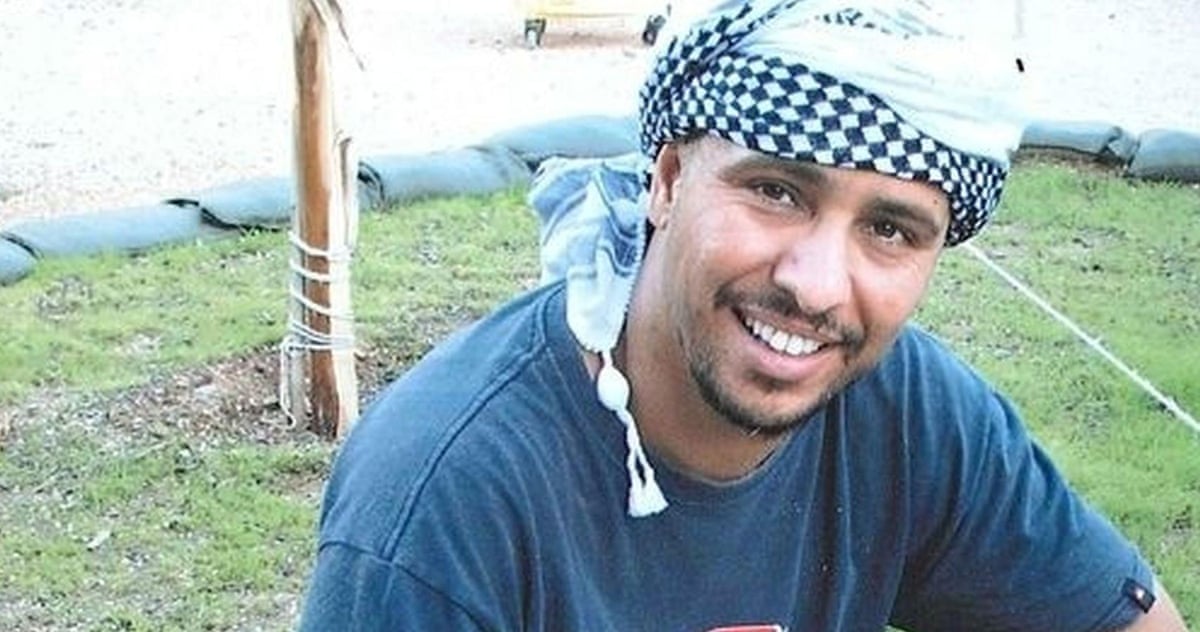Mohamedou Slahi, author of bestselling memoir Guantnamo Diary, says he would reunite with his children and write books if released after 14 years

One of the most severely tortured men in the history of Guantnamo Bay presented his case for freedom on Thursday.
Held at Guantnamo without charge since August 2002, Mohamedou Ould Slahi endured beatings, death threats, sexual humiliation and rape threats against his mother by US personnel at the wartime prison.
Yet Slahi, an unlikely bestselling author after his 2015 memoir, Guantnamo Diary, made him the highest-profile detainee unconnected to the 9/11 plot, contends that he seeks only to reunite with his children, start a small business and write books in his post-Guantnamo life and would even welcome his old guards over for a cup of tea.
In a 17-minute public hearing that served as the Guantnamo equivalent of a parole board, Slahi, clean shaven and bald in a white jumpsuit, barely moved. His military representatives and attorneys argued that the Mauritanian citizen poses no threat to the US. Slahi occasionally stroked his forearms, his only gesture of active participation in a process that poses his best chance for release.
Despite all the US government has done to him, Mohamedou has made clear that he holds no grudge against anyone at Guantnamo, one of his attorneys, Theresa Duncan, told the board.
Attorneys for Slahi view the hearing, a non-legal process known as a Periodic Review Board (PRB) that examines the risk of releasing a detainee, with cautious optimism. The simple fact that the military is holding a PRB for Slahi has raised expectations that he will go free.
After years of waiting, Mohamedou finally had a chance to show the board that he poses no threat whatsoever and should be released, said another of Slahis attorneys, Hina Shamsi of the American Civil Liberties Union.
We are hopeful that after seeing the strong evidence and support Mohamedou has, the board will do the right thing and clear his path to freedom.
The US government, however, indicated it does not view releasing Slahi as a foregone conclusion. Its profile of him, submitted to the PRB, referenced a broad network of terrorist contacts while living in Germany, Canada and Mauritania that could provided him with an avenue to reengage [in violence], should he decide to do so.
Still, the government assessed that if Slahi was released back to his native Mauritania, he probably would reunite with his family, take care of his sisters, and start a business. If permitted foreign travel, the US judged, Slahi will probably promote his book Guantnamo Diary globally.
With Republican congressional resistance to emptying the detention facility undiminished, Barack Obamas last option for fulfilling his famous pledge to close Guantnamo is to transfer detainees out, as that track requires no legal change or congressional approval. For those detainees not approved for transfer by a 2010 internal review, like Slahi, the PRB is the only practical ticket out of Guantnamo.
Accordingly, after years of widely criticized delays, the administration has accelerated the PRB process. Slahi is the 22nd detainee to receive a PRB in 2016. Two more are scheduled for the next week; a third, announced on Thursday, will follow on 16 June.
Slahis team, attempting to anticipate questions about his post-Guantnamo life, said that his brother in Germany who last week was unable to enter the US for speaking engagements, including one with this reporter would finance his transition to freedom. Another brother, who works in retail, has offered to hire him as an accountant.
Friends in Mauritania also have committed to help. They said Slahi would be eager to live in Germany, Mauritania or any other location the board sees fit.
Reporters, human rights campaigners and representatives of the Mauritanian embassy were able to view Slahis PRB at the Pentagon, via satellite feed from Guantnamo. The board members, representing a panoply of US security agencies, asked no questions before ending the public portion of the hearing.
Weve had him confined at Guantnamo for nearly 14 years
Read more: www.theguardian.com









![[Video] How to get rid of bed bugs in Toronto](https://www.thehowtozone.com/wp-content/uploads/2019/10/maxresdefault-2-100x70.jpg)


